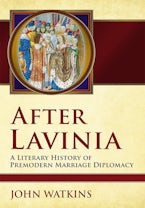Watkins's study of marriage diplomacy is a compelling work which proves an indispensable reference for readers of all creeds: from the literary analyst, to the specialist in diplomacy, gender studies or conflict studies, and to the lay reader trying to understand a volatile zeitgeist.... Dismissing the place of literature in the political episteme of a time and of all time has never been better argued as being a major error. Watkins's opus is not only a major and fresh contribution to the field, it is an enlightening commentary on contemporary politics and on the necessity of a literary view of history.
(Cahiers Élisabéthains) Embarks upon an impressive tour of literary history to show how marriage acts served transnational diplomacy.... Historians will benefit from reading John Watkins' intellectually engaging literary history.
(H-FRANCE) Watkins's book makes many insightful claims and raises a lot of intriguing questions about premodern mariage diplomacy.
(Sixteenth Century Journal) Watkins's work offers a fresh perspective on interdynastic marriage and on diplomacy. As he makes clear throughout the text, Watkins wants to uncover the woman's voice in diplomatic history. Throughout the text, he does just that, creating a strong scholarly analysis that foregrounds gender and affirms the importance of the domestic, the maternal, and the reproductive.... Overall, Watkins's fascinating and ambitious work offers a positive contribution to academic conversations on queenship, marriage, international diplomacy, and literary celebrations and critiques of dynastic marriage.
(Clio) Watkins raises authentically interesting questions about politics, gender, and religion, and demonstrates the value of literary sources and literary analysis for this topic. It is especially valuable for assembling a range of texts on interdynastic marriage, including Jordanes, Gregory of Tours, the Venerable Bede, Paul the Deacon, Dudo, William of Apulia, Wace, William of Malmsbury, and others, theological works as well as twelfth- and thirteenth-century vernacular romances and their treatments of royal marriages.... The broad sweep of this study is impressive, displaying the range of possible practices for monarch, marrying in or out, up or down, lateral—or... choosing not to marry at all.
(Speculum) After Lavinia... provocatively aims at fostering a discussion about the nature of war and peacemaking in the premodern and modern worlds, and how the intertwined roles of gender, the passions, and, more generally, the irrational played a significant role in pre-Westphalian diplomatic society, and were later dangerously confined to the literary realm. In this sense, After Lavinia is a wonderful and thought-provoking book: it should be essential reading in and beyond the community of scholars working on these topics.
(Diplomatica) A powerful, wide-ranging study.... A triumphant, fruitful marriage of critical methodologies and fields. It encompasses literary and cultural history, diplomatic history, international relations, gender studies, and other approaches. Its comparatist focus has much to teach specialists in English literature.... Magisterial.
(Modern Language Quarterly) A fascinating interdisciplinary study of marriage diplomacy from the post-Roman period through the seventeenth century.... Watkins draws upon chronicle histories, medieval romances, diplomatic records, international society theory, pastoral verse, political pamphlets, and early modern drama to develop an ambitious and nuanced argument about the changing ideology of political marriages.... Watkins's book is both concise and elegantly structured given its very broad scope. It offers an important contribution to the study of diplomatic cultures, especially by articulating ideological positions that shaped the political roles of women, and scholars of any part of the European Middle Ages and early modern periods will learn a great deal from its longue durée narrative.
- Amanda Walling (Comparative Literature Studies)

